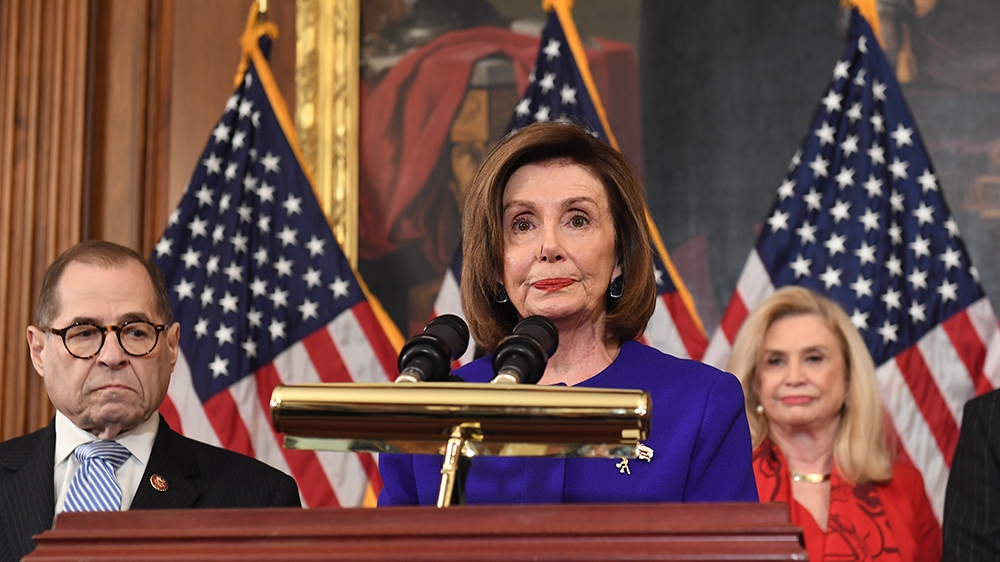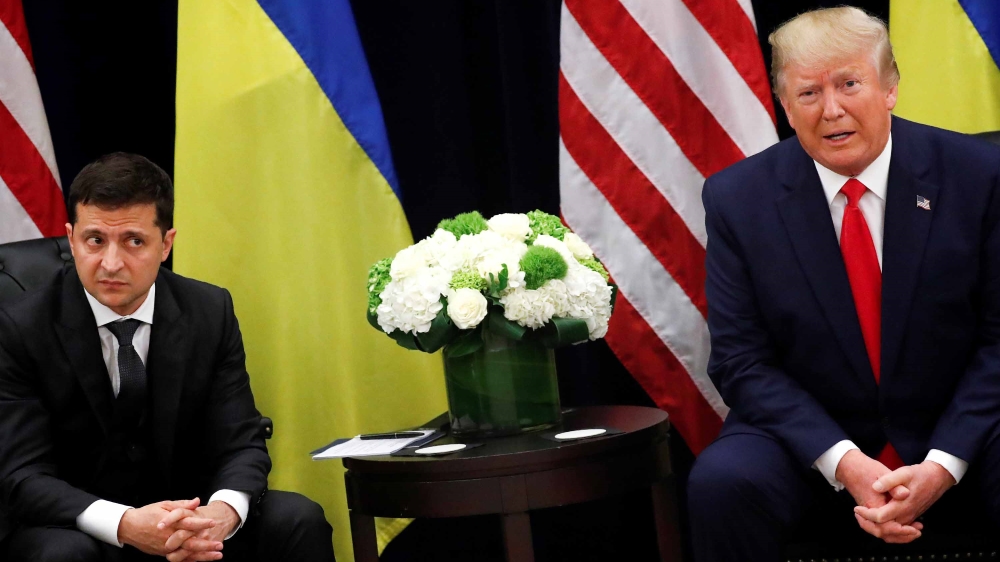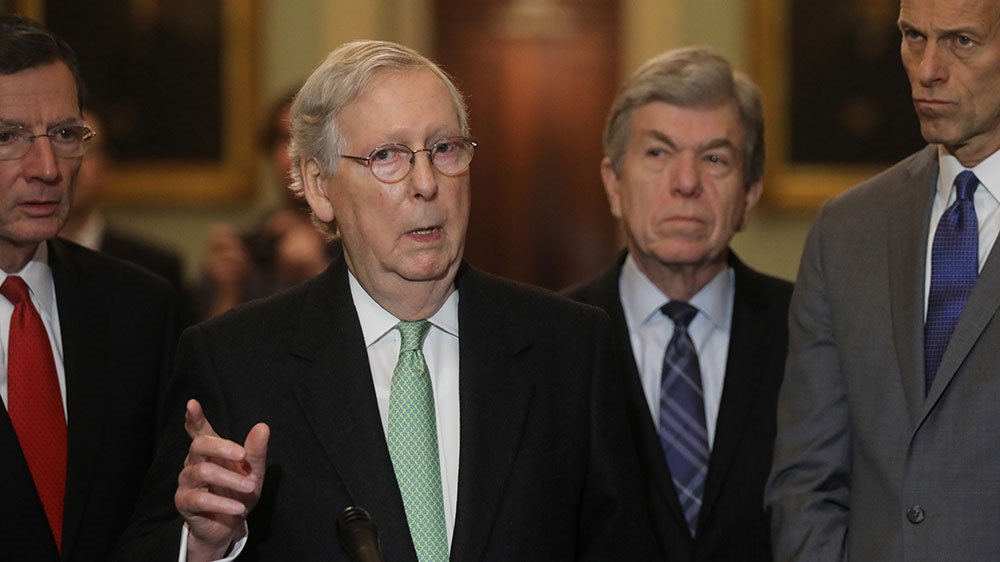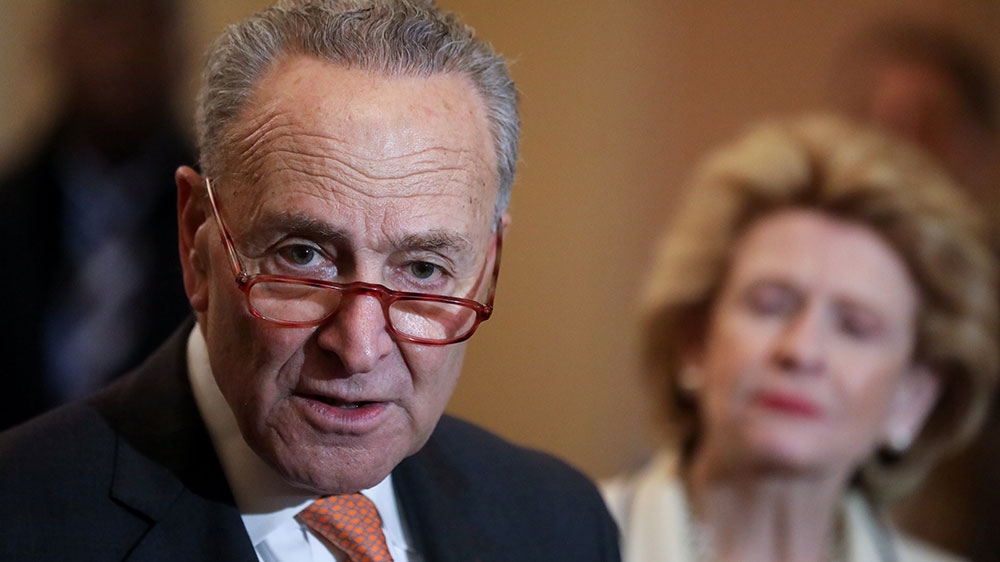Trump impeachment: Divisive rhetoric marks eve of House votes
Trump and his fellow Republicans trade jabs with Democrats as US House set to vote on impeachment on Wednesday.

Washington, DC – The eve of the US House of Representatives votes on whether to impeach President Donald Trump was full of name-calling, divisive rhetoric and fighting over next steps.
Trump faces a near-certain impeachment on Wednesday on charges he abused power and obstructed Congress over his dealings with Ukraine.
Keep reading
list of 3 itemsIn 650-page impeachment report, Democrats say Trump betrayed US
US House panel approves Trump impeachment charges
The impeachment process has deepened political divides in the United States as the country heads for the 2020 presidential election.
Trump on Tuesday sent a sharply worded letter to Speaker Nancy Pelosi, the top Democrat in the House, expressing his “strongest and most powerful protest” against impeachment. He said he was innocent of all the charges, and if Democrats proceeded they would be “declaring open war on American democracy”.
“I have no doubt the American people will hold you and the Democrats fully responsible in the upcoming 2020 election,” Trump said. “They will not soon forgive your perversion of justice and abuse of power.”
The letter, which Trump said he did not expect to change anything but was for the “purpose of history”, came as Republicans and Democrats fought over the rules of debate for Wednesday’s expected impeachment votes.

The House will debate and vote on two articles of impeachment: abuse of power and obstruction of Congress.
Pelosi called the letter “sick”.
She also wrote her own letter, urging her colleagues to “support and defend our constitutions from all enemies, foreign and domestic”.
“Tomorrow the House of Representatives will exercise one of the most solemn powers granted to us by the Constitution as we vote to approve two articles of impeachment against the president of the United States,” House Speaker Nancy Pelosi said in a letter to fellow Democratic lawmakers on Tuesday.
“During this very prayerful moment in our nation’s history, we must honor our oath to support and defend our constitution from all enemies, foreign and domestic,” she added.
Wednesday’s proceedings will kick off at 9am (14:00GMT) with debate on the rule governing the longer impeachment debate. After the rule is approved, there will then be six hours of debate, divided equally among Democrats and Republicans. The final votes are expected in the afternoon or early evening on Wednesday.
Trump’s Ukraine dealings
Democrats accuse Trump of pressuring Ukraine to open an investigation the president’s political rival and former vice president, Joe Biden, who is also a frontrunner in the 2020 Democratic presidential race. They also charge that the president obstructed their investigation by refusing to comply with subpoenas and directing members of his administration to do the same.
The impeachment inquiry, launched in September following a whistle-blower complaint, was centred on a July 25 phone call during which Trump asked Ukrainian President Volodymyr Zelenskyy to open an investigation into Biden and his son, Hunter, who had served on the board of a Ukrainian gas company. There has been no evidence of wrongdoing by the Bidens. Trump also wanted Zelenskyy to investigate a debunked conspiracy theory that Ukraine, not Russia, interfered in the 2016 US presidential election.
At the time of the call, the Trump administration was withholding nearly $400m in Congress-approved military assistance from Ukraine.
Citing testimony by current and former US officials, Democrats also accuse Trump of leveraging a White House meeting that Zelenskyy wanted in exchange for the investigations.

Wednesday’s vote comes after more than two months of investigation in the House, including hours of testimony, hundreds of pages of reports by Democrats making their case for impeachment, dozens of witnesses and repeated denials of wrongdoing by the president.
Impeachment in the 435-member House must be approved with a simple majority.
The House votes are expected to play out largely along party lines. Some Democrats who are up for re-election in districts Trump won in 2016 have yet to announce how they will vote, but impeachment is expected.
If Trump is impeached, the articles of impeachment will then be sent to the Senate for a trial.
Top Senators trade jabs
As for what a trial would look like remained a point of contention for Republicans and Democrats, who traded barbs on Tuesday over the next steps.
Senate Majority Leader Mitch McConnell has said the trial will be senators’ “first order of business” when they return to Washington, DC, in January. He has indicated he would like a swift trial, but Democrats have requested at least four additional witnesses be heard, including acting White House Chief of Staff Mick Mulvaney and former Trump National Security Adviser John Bolton.
McConnell on Tuesday appeared to reject that request, taking aim at the top Democrat in the Senate, Chuck Schumer.
“So, now the Senate Democratic leader would apparently like our chamber to do House Democrats’ homework for them,” McConnell said on the Senate floor.

“And he wants to volunteer the Senate’s time and energy on a fishing expedition to see whether his own ideas could make [House Intelligence] Chairman’s [Adam] Schiff’s sloppy work more persuasive than Chairman Schiff himself bothered to make it,” he added. “From everything we can tell, House Democrats’ slapdash impeachment inquiry has failed to come anywhere near – anywhere near – the bar for impeaching a duly elected president, let alone removing him for the first time in American history.”
But Schumer hit back, accusing McConnell of wanting to use the Senate to help “cover something up”.
“What is Leader McConnell afraid of? What is President Trump afraid of? The truth?” Schumer asked on the Senate floor.
“If you’re trying to conceal evidence and block testimony, it’s probably not because the evidence is going to help your case. It’s because you’re trying to cover something up,” Schumer added.

McConnell later reportedly said he feels “optimistic” that Republicans and Democrats can agree on a “phase one” of the trial, which would include the presentation of the case and defence.
“We’ll see at that point whether there are 51 members of the Senate who want to take one of two directions – either going in the direction of witnesses or going in the direction of voting on the articles of impeachment,” he was quoted by Reuters news agency as saying.
A two-thirds majority vote is required in the 100-member Senate to convict and remove a president from office.
The Senate is made up of 53 Republicans, 45 Democrats and two independents who caucus with the Democrats. At least 20 Republicans would have to vote with all Democrats and the two independents to remove the president.
No US president has ever been removed from office via the impeachment process laid out in the Constitution. Only two presidents – Andrew Johnson in 1868 and Bill Clinton in 1998 – have been impeached.